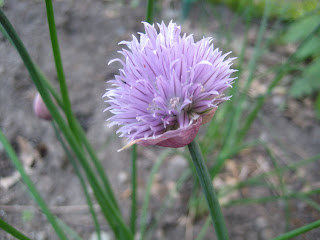A few weeks ago Gail and I had the pleasure of attending one of Ricki Carroll's day long Cheese Making 101 classes. Ricki has been running a mail order cheese making supply business since 1978 and is affectionately known as Ricki the Cheese Queen. She is featured in chapter 9 'Six Impossible Things Before Breakfast 'of Barbra Kingslover's Animal, Vegetable, Miracle as well as the supplemental recipes to that chapter. Her Cheese Making 101 workshops, which are taught in her Massachusetts home often have waiting lists longer then the 4o person-plus capacity of the classes and are generally sold out months in advance.
Over the course of an afternoon Gail, myself, and 40 others learned the basic concepts and ideas of beginners cheese making. Over the 7 hours we learned to make Farmhouse Cheddar, Queso Blanco, Whole Milk & Whey Ricotta, a 30-minute Mozzarella, Fromage Blanc, Creme Fraiche, and Marscapone. We indulged in countless samples of fresh made still warm soft cheeses and yogurts while we learned basic techniques to take home and start making our own cheeses.
We also learned the differences between raw, pasteurized, and ultra pasteurized milk in color, texture, and the differences to take into account when using them to make cheese. Here is a great shot of Ricki and her partner Jamie showing us 2 different methods for their 30-minute Mozzarella with a raw milk and a pasteurized milk:
Notice the teaching table and it's ingenious design. The overhead mirror allowed for everyone in the class to see exactly what we should be looking for in terms of curd formation as we watched the various cheeses get made. At the end of the class we purchased some cheese making supplies of our own so Gail and I could return home and make some soft cheeses as a way to get comfortable with the process.
We also decided if we wanted to make soft cheese we should try to acquire some raw milk. Current Massachusetts law calls for raw milk laws in Massachusetts are fairly strict. Raw milk cannot be sold if it is older then 5 days. Each container has to be labeled 'raw cow's milk' as well as a warning stating 'Raw milk is not pasteurized. Pasteurization destroys organisms that may be harmful to human health.' A similar sign must be placed where the raw milk is sold, which to date can only be directly on a farm, no retail sale of raw milk is permitted, even at farmer's markets. Farmers selling more then 20 quarts a day must obtain a vendor's license from the nearest town milk inspector, and any farm, no matter how small is legally required to obtain a certificate of registration from the Commissioner of Food and Agriculture.
I do not exclusively drink raw milk, and I don't believe I plan on doing so, but I feel that people should be afforded the choice to drink whatever kind of milk they want, and have easier access to raw milk if they choose to consume it. I think many states, including Massachusetts are overly cautious with raw milk producers. People the world over have been drinking raw milk for generations, and though it can make some people sick, I do not think there is a real danger to allow consumers to make their own educated choices.
Gail and I wanted to start making cheese, and wanted our first experiments to be with raw milk because from the class it seemed that the best results came from cheeses made with raw milk, we also wanted to support a small local farmer if we could. Gail remembered the person who sold her the beautiful new kitchen cabinets mentioned he was what amounted to a hobby farmer. He didn't raise livestock or produce for profit, but more for fun and to provide some very local, very fresh food for his family and friends. Gail contacted him to see if we could arrange a visit and to purchase some raw milk from him.
Per his request I am not using his name or location. Farmer X is not licensed in any capacity and out of respect for his desire for privacy I won't out him. This past Saturday Gail and I took a drive to Farmer X's house, where we saw his laying chickens, the chickens he raises for food, and his 3 cows. A pair of Jersey-Holstein mixes for milk and a Jersey-Holstein/Angus young bull which he is raising for beef.
Here are 2 great shots of Gail and I with the 2 Jersey-Holsteins and one of the young Jersey-Holstein/Angus bull:
We got to hang out with the 3 cows and learn about how they are raised (pastured right behind Farmer X's house!!) along with our very own up close anatomy and physiology lessons. After meeting the cows we headed inside to sample some milk, chocolate milk and fill up the containers we brought with milk, most of it fresh that morning, and some from the past few days. We departed with 5 gallons of delicious raw milk and a dozen multi colored eggs.
A huge thanks to Farmer X for opening up his home to us and showing us his beautiful home and animals . Thanks to his cows and milking efforts we were able to start our cheese making in style.
Stay tuned to the next post to see what came out of the 5 gallons of milk we took home!!










